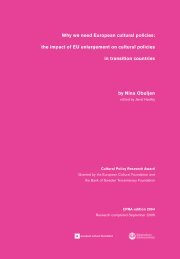Tony Bennett, Differing diversities - Council of Europe
Tony Bennett, Differing diversities - Council of Europe
Tony Bennett, Differing diversities - Council of Europe
Create successful ePaper yourself
Turn your PDF publications into a flip-book with our unique Google optimized e-Paper software.
<strong>Differing</strong> <strong>diversities</strong>too, had – and has – strong centrist tendencies, although these have now been significantlyqualified by the devolution <strong>of</strong> significant areas <strong>of</strong> responsibility to thegovernments <strong>of</strong> Northern Ireland, Scotland and Wales and the establishment, since1994, <strong>of</strong> autonomous Arts <strong>Council</strong>s for each <strong>of</strong> these alongside the Arts <strong>Council</strong> <strong>of</strong>England.Assessing the consequences <strong>of</strong> these different systems <strong>of</strong> government for culturaldiversity policies is, however, a difficult matter that cannot be answered abstractlysince it is likely that these vary according to the type <strong>of</strong> diversity that is at issue.From the point <strong>of</strong> view <strong>of</strong> autochthonous and multinationalist claims to diversity,more dispersed and devolved systems <strong>of</strong> government have obvious advantages.The role <strong>of</strong> the cantons in sustaining Switzerland’s commitment to the principles<strong>of</strong> quadrilingualism and language territoriality has obviously been crucial, just asit is clear that the cultural role <strong>of</strong> the Welsh language has been – and is likely to befurther – strengthened as a consequence <strong>of</strong> devolution. Yet the situation <strong>of</strong>tenlooks different if we consider the situation <strong>of</strong> immigrant groups. Although theseneed not benefit from a strong and directive central state (Austria is a case inpoint), central governments can <strong>of</strong>ten play a leading role in developing culturalpolicy agendas and legislative contexts for diversity in the face <strong>of</strong> what can <strong>of</strong>tenbe the narrower and more parochial chauvinisms <strong>of</strong> provincial or local administrations.There is thus little doubt that, in Canada, the federal government hasplayed the leading role in developing the varied conceptual parameters that havegoverned successive phases <strong>of</strong> Canada’s engagement with multiculturalism aswell as promoting the legislative and civic environments within which culturaldiversity has been pursued. It is also true that in Canada the federal level <strong>of</strong> governmenthas proved more responsive than most provincial governments to theclaims <strong>of</strong> Canada’s First Nations.Direct versus arm’s-length forms <strong>of</strong> cultural administrationA significant factor in any calculations about the prospects for diversity concernsthe extent to which different systems <strong>of</strong> cultural administration allow for theemergence <strong>of</strong> various “champions for diversity” within those systems. The distinctionbetween arm’s-length systems <strong>of</strong> administration <strong>of</strong> the kind that are foundin both Canada and the United Kingdom where the central arts and cultural ministriesallocate monies to a range <strong>of</strong> semi-autonomous arts councils, film institutesand similar agencies which are then responsible for dividing these funds betweendifferent cultural programmes and institutions, and the practice through whichfunding and programme priorities are more directly determined and administeredby central arts and cultural ministries (France is the classic example, 1 but this tendencyis evident in both Austria and Bulgaria) is relevant here.Although the matter would need further investigation, the evidence from a number<strong>of</strong> the country visits would suggest that arm’s-length systems do increase the likelihoodthat there will be a strong and continuing voice for diversity within__________1. See Looseley, 1995.48














